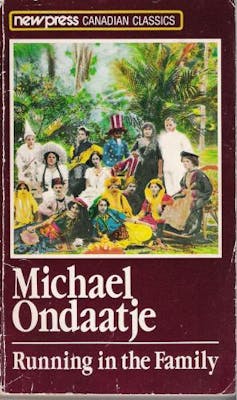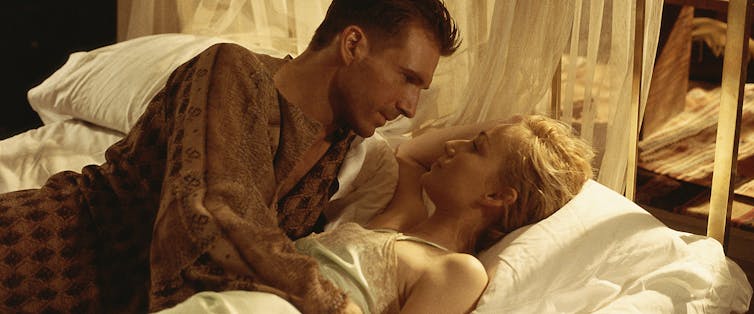By Jody Mason and Dessa Bayrock
“American movies, English books — remember how they all end?…The American or the Englishman gets on a plane and leaves. That’s it. The camera leaves with him. He looks out of the window at Mombasa or Vietnam or Jakarta, someplace now he can look at through the clouds. The tired hero. A couple of words to the girl beside him. He’s going home. So the war, to all purposes, is over. That’s enough reality for the West. It’s probably the history of the last two hundred years of Western political writing. Go home. Write a book. Hit the circuit.” – Michael Ondaatje, Anil’s Ghost.
In addition to receiving a coveted spot on the 2018 Man Booker longlist for Warlight, Michael Ondaatje recently won the Golden Man Booker Prize for his novel The English Patient. Honoured with a Booker when it was published in 1992, the book has now been “crowned as the best work of fiction from the last five decades of the Man Booker Prize.”
The Golden Man Booker was created to celebrate the 50th anniversary of the Man Booker, now one of the world’s best-known literary awards. A panel of writers and journalists were each assigned a decade in the prize’s history, and each was asked to choose one novel.
British novelist, Kamila Shamsie — whose 2017 novel Home Fire was longlisted for a Booker — championed Ondaatje’s The English Patient as the winner of the 1990s. The public was then invited to select the winner from the five books in an online poll, and Ondaatje came out on top.
Ondaatje’s Booker wins are complicated. More than anything, Ondaatje’s Golden Booker win showcases the contradictions of literary value in the current context of the global commodifications of creative goods. His 1992 success can be examined within the broader context of the prize, its relation to postcolonial fiction and the globalization of Can Lit.
The symbolic capital of legitimation
In his 2001 study, The Postcolonial Exotic, literary critic Graham Huggan argues that the Man Booker Prize has deep connections to a history of slave labour and indentureship. A multinational agribusiness with roots in the Caribbean sugar industry created the prize. Despite its colonial history, the Booker has frequently praised postcolonial novels that critique the structures of imperialism from which the Booker was born.
In Huggan’s opinion, this pattern deserves examination: does the Booker fold resistant postcolonial novels into a “shared” British culture that is authorized, once again, by a metropolitan centre?
Does the Man Booker, Huggan asks, permit England, a country that is “no longer a player in the world’s economic sweepstakes,” to accumulate “symbolic capital as a legitimizing cultural force?”
The English Patient decentres Englishness through the figure of its non-English “English” patient (Almásy). Yet its Booker win harnessed both the novel and Ondaatje to an institution that lauds cultural diversity even as it repeats old structures of power and cultural distinction.
Similar charges have been levelled against the form and function of official multiculturalism in Canada, particularly as it is leveraged in the literary prize industry.
A Sri-Lankan-born writer who emerged as a poet in the 1960s and whose creative work began to explore his South Asian roots in the 1980s, Ondaatje has come to represent a liberal multiculturalism that the Canadian government has been happy to promote on the international stage.
Can Lit goes global
The Canadian literary community had already celebrated Ondaatje with two Governor General’s Literary Awards for his poetry collections The Collected Works of Billy the Kid (1970) and There’s a Trick With a Knife I’m Learning To Do (1979).

His 1992 Booker win, however, turned Can Lit global: it single-handedly shaped the international image of both Canada and Canadian writing.
Ondaatje’s 1992 Booker win is also a constitutive part of a global era of “blockbuster” fiction that changed literary publishing in English Canada.
Ondaatje’s rise to international fame in the 1990s coincided with the aggressive consolidation of publishing in Canada to a handful of multinational corporations. These changes included the eventual partial and then total sale of Ondaatje’s publisher, McClelland & Stewart, to Random House of Canada (now Penguin Random House).
These changes nurtured a publishing environment in which authors’ futures are snapped up by the multinationals in increasingly competitive bids that are driven, to a large extent, by literary prizes.
The literary prize and the contradictions of literary value
It is tempting to argue that the Golden Man Booker for The English Patient can be explained because the novel was made into a blockbuster film. This recycling of content to produce a maximum of profit in an unpredictable market for creative products is now very familiar to fiction readers.
Indeed, Ondaatje is probably best-known as the “author of the novel that was adapted into the multiple Academy Award-winning film of the same title.” The film is sensuous, offering a lush visual tour of the globe while heightening the novel’s love story at the expense of its political critique — notably the critique of western power and the racism that subtends it.
In his Golden Booker acceptance speech, Ondaatje acknowledged that Anthony Minghella’s wildly successful 1996 film adaptation of his novel “probably had something to do with the results of this vote.”

We think the consecration of The English Patient with the Golden Booker is more complex than this. The very existence of the Man Booker Prize and other prestigious literary prizes, such as Canada’s Scotiabank Giller Prize, offer evidence of the continuing distinctiveness of a value construed as “literary.”
Ironically, such value continues to be produced by longstanding historical distinctions between literary value and the market, particularly those that emerged in the Romantic period’s emphasis on spontaneous and natural processes of creation.
Such distinctions are the bread and butter of literary prizes, which consecrate not the skill of editing or the genius of marketing but literary excellence and authorial inspiration.
In such a context, writers’ gestures to their autonomy from the market are significant. In his acceptance speech, Ondaatje thanked “small presses everywhere — they were the first to publish me.” Indeed, Ondaatje is a long-time supporter of small publishers such as Toronto’s Coach House Books and small-press undertakings such as Brick magazine. These are genuine commitments.
It is also apparent that such commitments, like so much that attends the production of specifically literary celebrity, have meanings that extend beyond Ondaatje’s framing.
Despite, or, more accurately, because of the relentless corporatization of literary publishing across the English-speaking world, small-press affiliations lend Ondaatje a non-instrumentalized and uncommercial literary credibility that writers still need. The search for such credibility is what drives our insatiable interest in literary prizes, Golden and otherwise.
In an age when literature’s commodification has never been so apparent and flagrant, appeals to the writer’s autonomy — established through small-press roots and the authenticating consecration of the literary prize — are more critical than ever.
This article is republished from The Conversation under a Creative Commons license. Carleton University is a member of this unique digital journalism platform that launched in June 2017 to boost visibility of Canada’s academic faculty and researchers. Interested in writing a piece? Please contact Steven Reid or sign up to become an author.
All photos provided by The Conversation from various sources.
![]()
Monday, July 23, 2018 in The Conversation
Share: Twitter, Facebook



